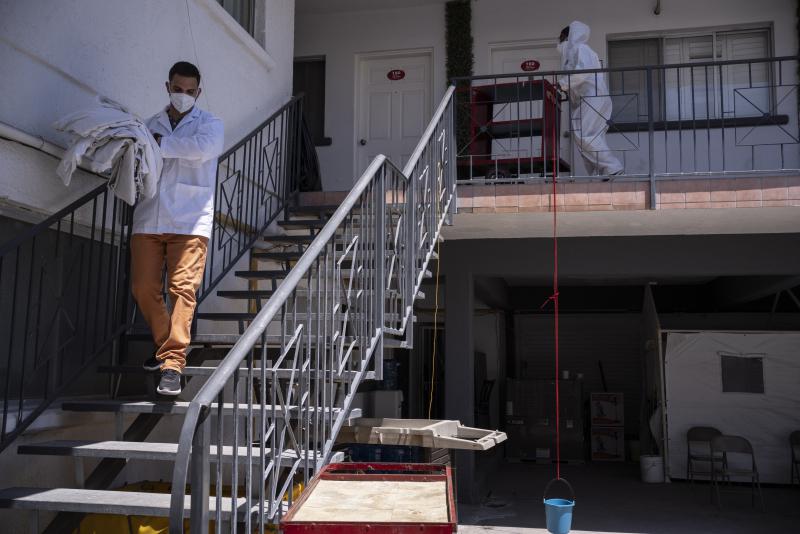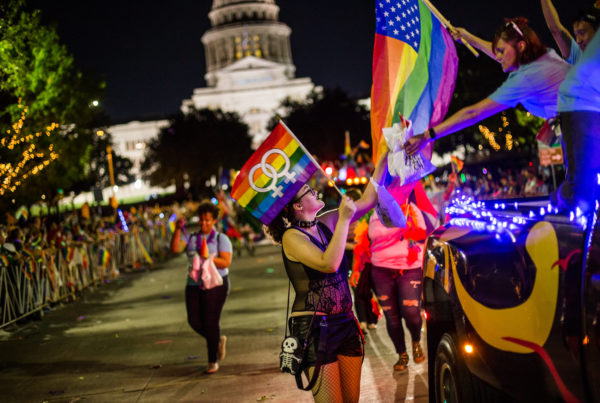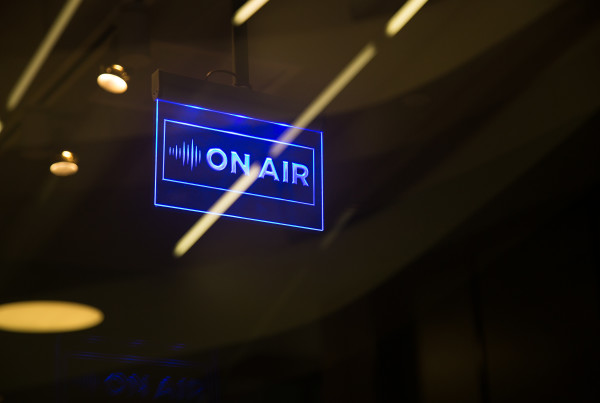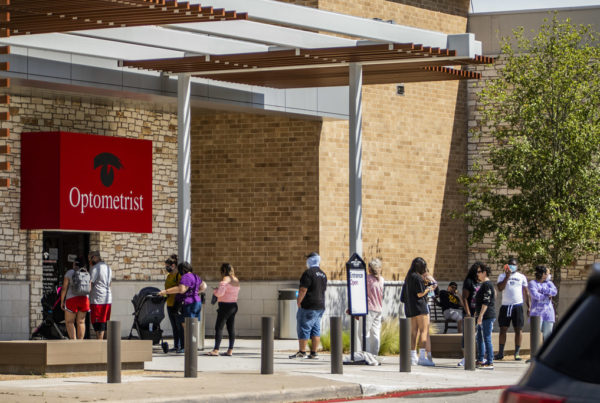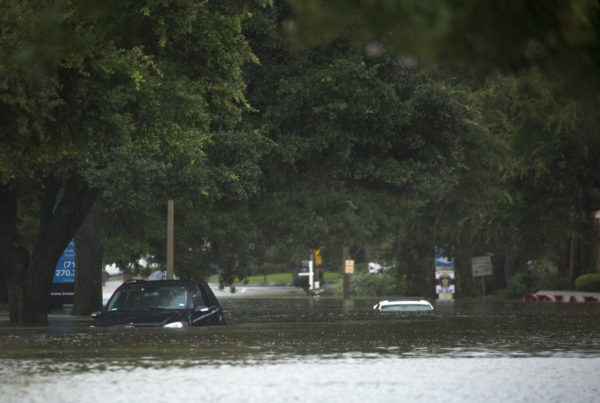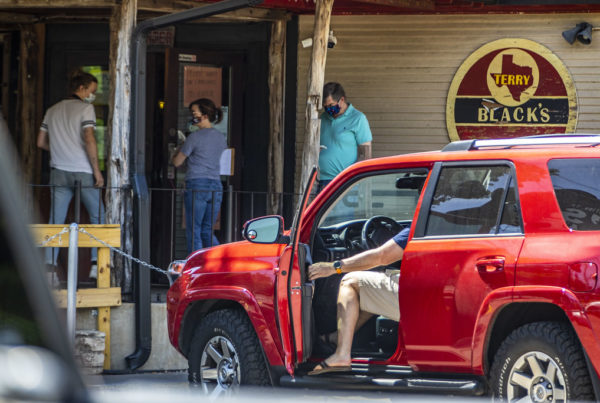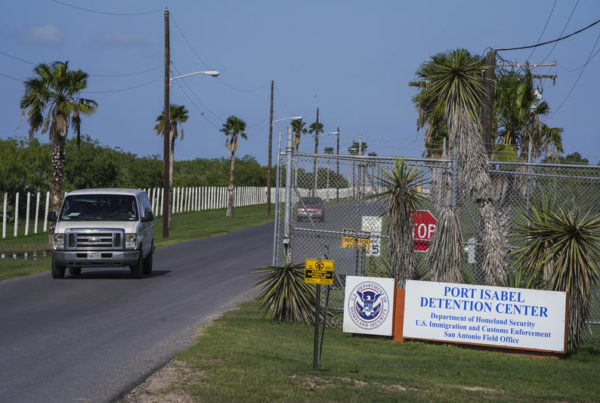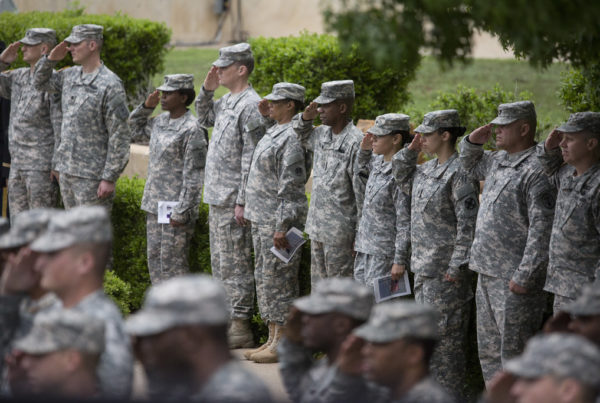From KERA:
Despite the coronavirus pandemic, Hotel Flamingo in Ciudad Juarez has been filling up with guests.
When they arrive, they have to go through a thorough disinfection process. First, they step inside a tray filled with diluted bleach, to clean off the soles of their shoes.
Then it’s on to a handwashing station, where they’re instructed to scrub with a generous amount of soap, and follow up with a big squirt of hand sanitizer.
Finally, they receive a fresh face mask, and the hotel coordinator sprays their shoes with an alcohol mixture.
These guests aren’t tourists on vacation. They’re people who tried to cross into the U.S. but, for a variety of reasons, have been sent back to this border city and need a safe place to stay.
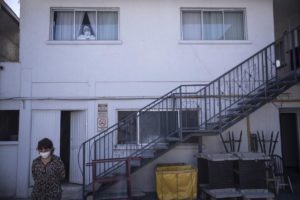
Doctor Dayaites Rios is pictured through the window in the attending physician’s room while Doctor Leticia Chavarria stands below on May 30, 2020 at Hotel Filtro in Ciudad Juarez in the state of Chihuahua, Mexico.
“We’re taking migrants off the street”
Migrant shelters, which are trying to control the spread of COVID-19, can’t immediately take them in. So Hotel Flamingo has been temporarily converted into a “filter hotel” — a space where they can quarantine for 14 days before transferring to a longer-term shelter.
“We’re taking migrants off the street and away from the risk of potential infection,” said Leticia Chavarria, the hotel’s medical coordinator. “We have them here for two weeks, and if during that time they don’t present any symptoms, then another shelter can receive them.”
Once guests have washed up, hotel coordinator Rosa Mani guides them to a waiting room with well spaced out chairs and explains how things work. Every guest will go through a preliminary health screening, then receive a private room.
“One of the first questions is if someone feels ill, if someone has a headache, a fever, or any symptom related to COVID,” said Mani, who is with the World Organization for Peace. “If someone says yes, then immediately they’re the first person we care for.”
There’s an isolation wing for people with COVID symptoms or who have come into contact with someone who’s infected, and another wing for everyone else.
Protocols are strict. Once a doctor goes up to the isolation area, she can’t come down until her shift is over. Anything she needs gets sent up in a bucket on the end of a rope, which Chavarria jokingly refers to as an elevator.
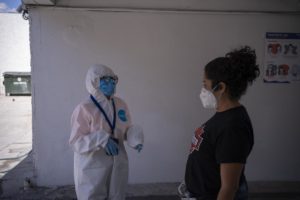
Rosa Mani, coordinator of Hotel Filtro, speaks to Portugese interpreter Flor Cedrella who was donning personal protective equipment and had just spoken to a Brazilian migrant in quarantine on May 30, 2020 at Hotel Filtro in Ciudad Juarez in the state of Chihuahua, Mexico.
Many groups came together to rent out the hotel, stock up on cleaning and medical supplies and transform it into a quarantine center, including the International Organization for Migration, the World Organization for Peace, Seguimos Adelante and several government entities.
It can accommodate up to 108 people and is currently about three-quarters full. Recently, several medically vulnerable migrants and their families were transferred there from the government-run Leona Vicario shelter, where there has been a cluster of COVID-19 cases. Seven of them have since tested positive for the virus. According to Mani, they are currently in isolation and are not experiencing health complications.
Some hotel guests have been forced to wait in Mexico as their asylum cases play out in U.S. immigration court, as part of the Trump administration’s Migrant Protection Protocols (MPP). They’ve been living in Juarez for months or longer — renting out rooms or apartments — and suddenly found themselves in need of new housing during the pandemic, unable to afford rent now that work has dried up. Some have also lost financial support from relatives in the U.S., who are also hurting due to the coronavirus and can no longer send money.
Others have been rapidly expelled from the border, under a public health directive issued as concern about COVID-19 grew.
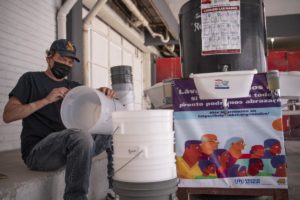
Michael Margolis, an American volunteer with NGO Seguimos Adelante disinfects buckets used by migrants for washing clothes on May 30, 2020 at Hotel Filtro in Ciudad Juarez in the state of Chihuahua, Mexico. Hotel Filtro was set up by non profits as a place for migrants, many of which have been rapidly expelled from the U.S. due to the pandemic, to quarantine at before being placed in a shelter.
A temporary safe haven
That includes a Honduran mother who arrived at the hotel with her two children: an 11-year-old daughter and 4-year-old son. She asked us not to use her name, out of fear for her family’s safety.
On a sunny afternoon in late May, she stood outside her room, taking in some fresh air while her son played behind her, stacking blocks into small towers.
Through a face mask, she recalled a journey that started last winter when, she said, a local gang tried to extort her.
“I sold candy,” she said. “What I earned was only enough to cover my family’s expenses.”
When she couldn’t pay, “they didn’t give me any option except to leave my country. They told me I had less than twelve hours to leave my country or they would kill me, along with my children.”
So she fled. She could not have predicted that a global pandemic would dramatically alter her plans. But by the time she reached the U.S.-Mexico border, coronavirus had reshaped daily life and public policy in both countries.
In late March, the Centers for Disease Control and Prevention (CDC) issued an emergency public health order that the Trump administration has used to expel unauthorized migrants at the border in a matter of hours, including asylum seekers. Officials take down basic identifying information in the field and then almost immediately send people back into Mexico or their home countries.


